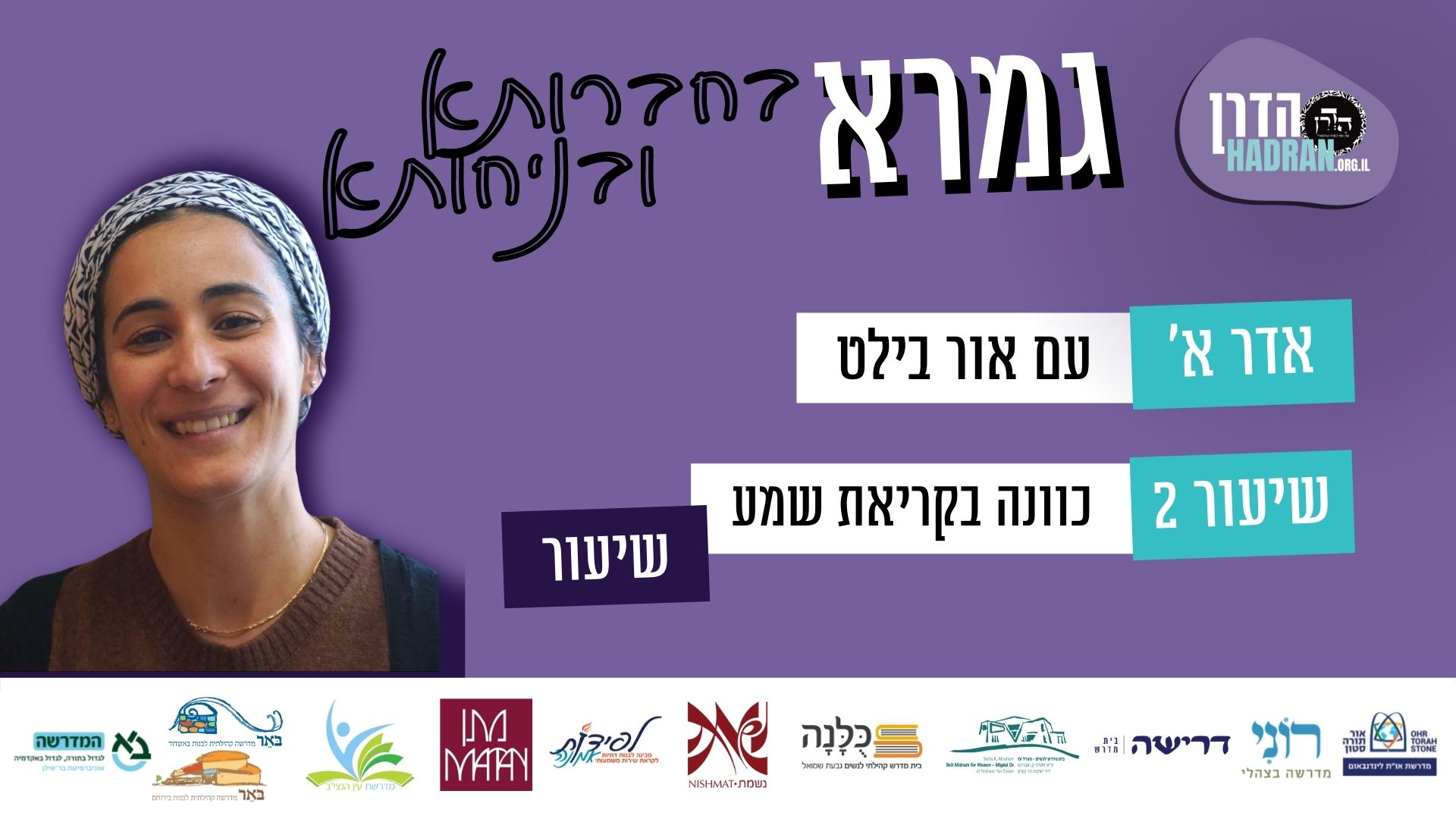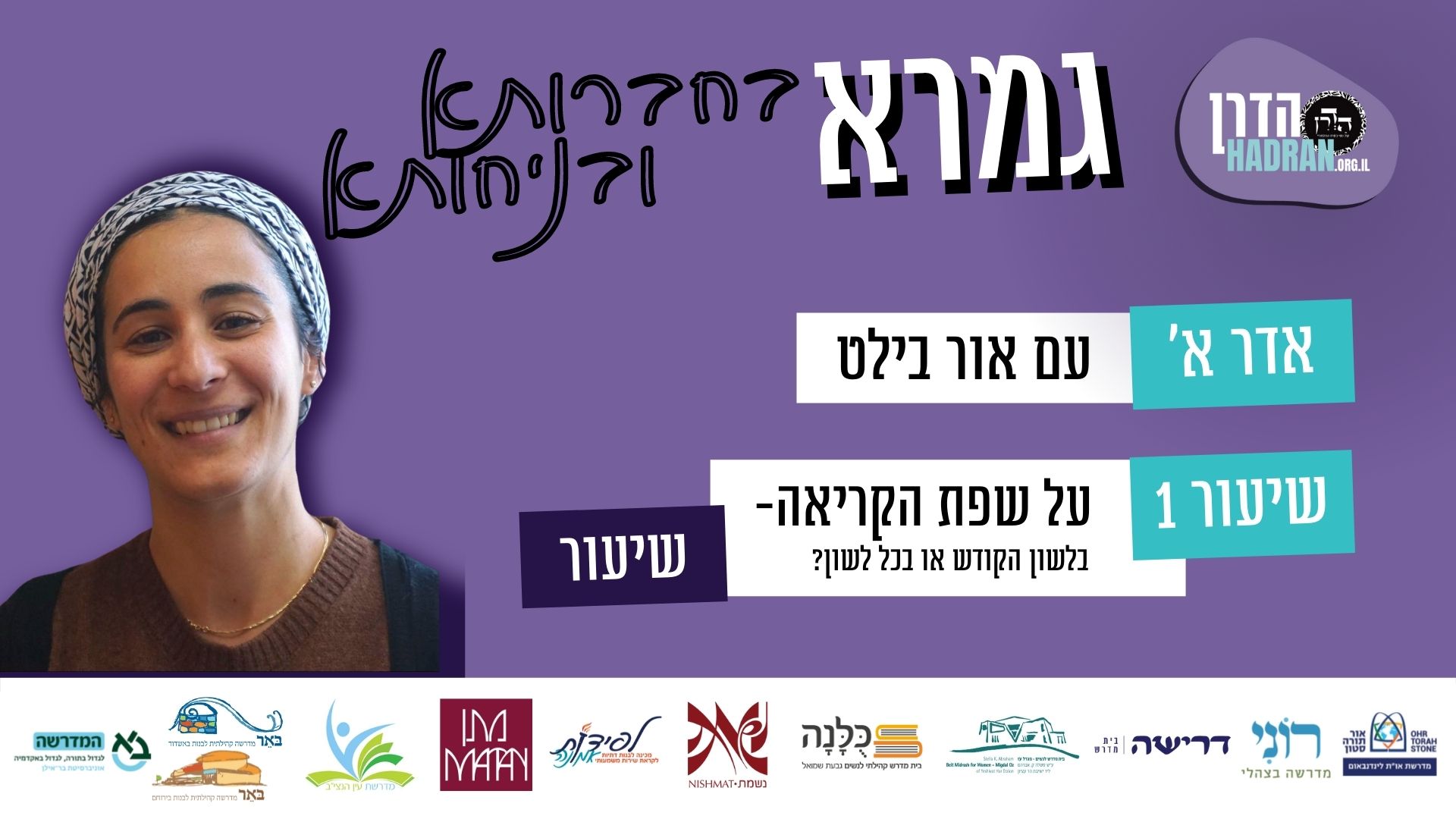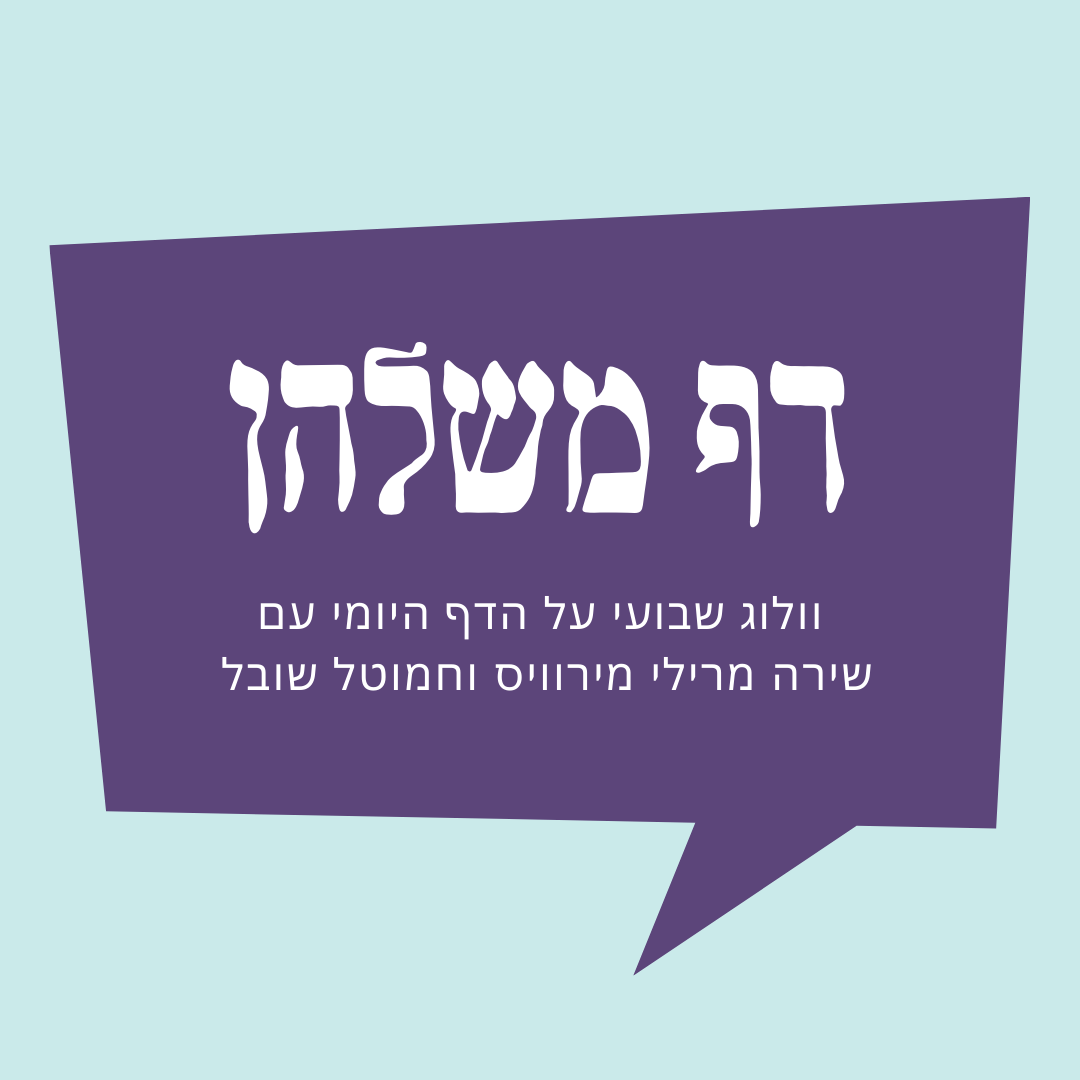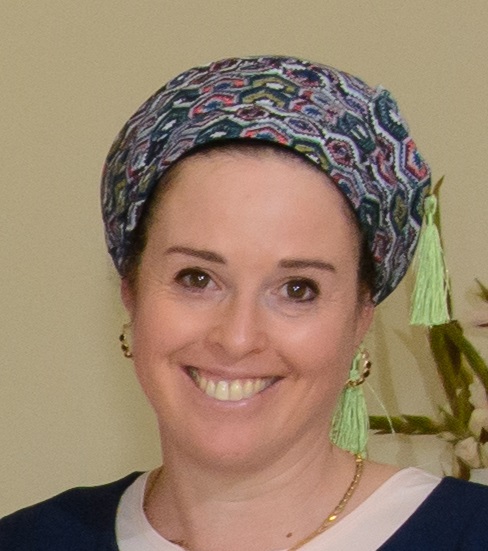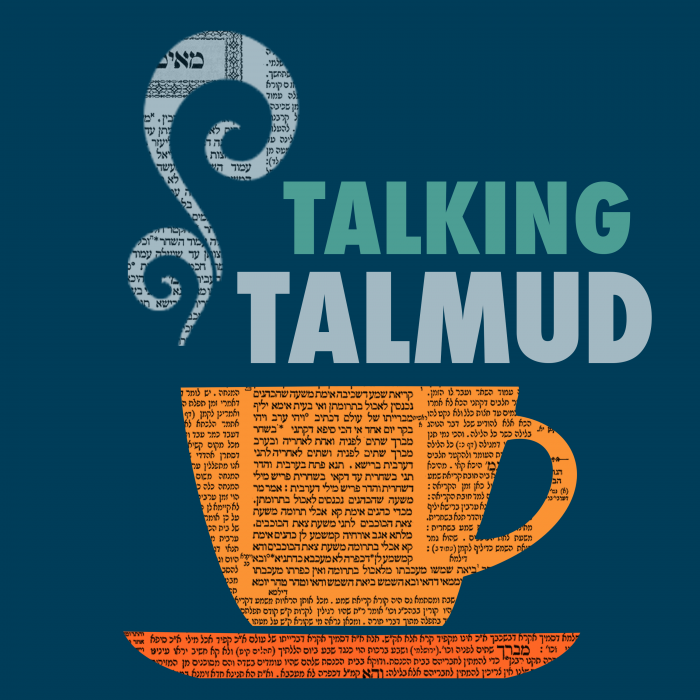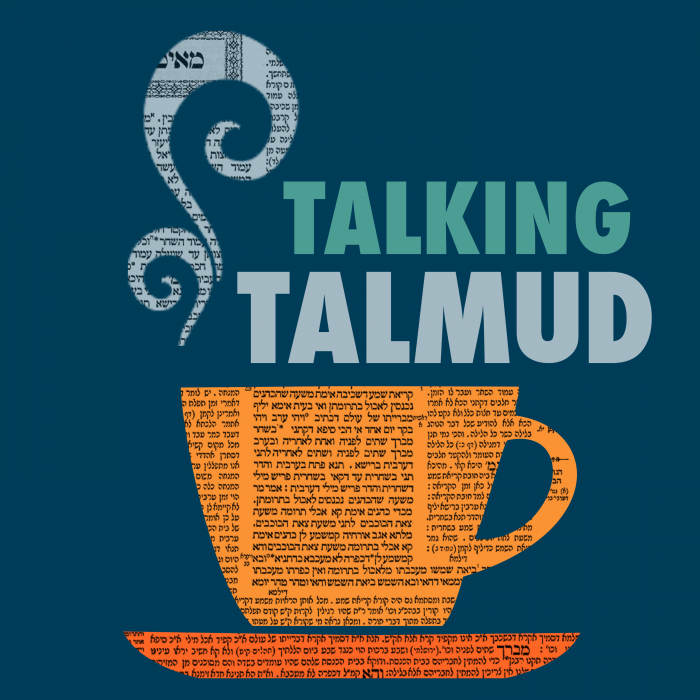שלושה שאכלו ביחד חייבים בזימון. באיזה נסיבות הם לא חייבים? מהו המקור לזימון בשלושה? האם שניים שאכלו יכולים לזמן? האם נשים יכולות לזמן? האם הן חייבות לזמן? למה נשים לא יכולים להצטרף עם עבדים ליצור זימון? מה קורה כששלושה אוכלים ביחד ואחד עוזב לפני שמברכים? אם מישהו נכנס לחדר כשמזמנים,מה הוא עונה? למה מוסיפים אמן לברכת בונה ירושלים בברכת המזון?
רוצה להקדיש שיעור?
כלים
העמקה
רוצה להבין מה באמת קורה מתחת לפני השטח של הסוגיה?
שיעורים, פודקאסטים והרחבות של מיטב המורות שלנו יפתחו לך עוד זוויות וכיווני חשיבה.
חדשה בלימוד הגמרא?
זה הדף הראשון שלך? איזו התרגשות עצומה! יש לנו בדיוק את התכנים והכלים שיעזרו לך לעשות את הצעדים הראשונים ללמידה בקצב וברמה שלך, כך תוכלי להרגיש בנוח גם בתוך הסוגיות המורכבות ומאתגרות.
פסיפס הלומדות שלנו
גלי את קהילת הלומדות שלנו, מגוון נשים, רקעים וסיפורים. כולן חלק מתנועה ומסע מרגש ועוצמתי.
ברכות מה
דַּחֲנַקְתֵּיהּ אוּמְצָא.
who was choked by a piece of meat and drank water in order to wash it down. He need not recite a blessing.
רַבִּי טַרְפוֹן אוֹמֵר ״בּוֹרֵא נְפָשׁוֹת רַבּוֹת וְחֶסְרוֹנָן״. אֲמַר לֵיהּ רָבָא בַּר רַב חָנָן לְאַבָּיֵי, וְאָמְרִי לַהּ לְרַב יוֹסֵף: הִלְכְתָא מַאי? אֲמַר לֵיהּ: פּוֹק חֲזִי מַאי עַמָּא דָּבַר.
We learned in the mishna that Rabbi Tarfon says: Over water one recites: Who creates the many forms of life and their needs. Rava bar Rav Ḥanan said to Abaye, and some say to Rav Yosef: What is the halakha in this dispute? He said to him: Go out and observe what the people are doing and act accordingly.
הדרן עלך כיצד מברכין
מַתְנִי׳ שְׁלֹשָׁה שֶׁאָכְלוּ כְּאַחַת, חַיָּיבִין לְזַמֵּן. אָכַל דְּמַאי, וּמַעֲשֵׂר רִאשׁוֹן שֶׁנִּטְּלָה תְּרוּמָתוֹ, מַעֲשֵׂר שֵׁנִי וְהֶקְדֵּשׁ שֶׁנִּפְדּוּ, וְהַשַּׁמָּשׁ שֶׁאָכַל כְּזַיִת, וְהַכּוּתִי — מְזַמְּנִין עָלָיו.
MISHNA: This mishna sets out the essential halakhot pertaining to the invitation to recite Grace after Meals after a joint meal [zimmun]: Three people who ate as one are required to form a zimmun and recite Grace after Meals. If, among the diners, one ate doubtfully tithed produce [demai], and first tithe from which its teruma was already taken, or second tithe, and consecrated food that were redeemed and therefore permitted to be eaten; and even the waiter who served the meal to the diners and who ate at least an olive-bulk from the meal, and the Samaritan [Kuti] who ate with two others at a meal; each of these people is included among the three to obligate those with whom they ate in a zimmun.
אָכַל טֶבֶל, וּמַעֲשֵׂר רִאשׁוֹן שֶׁלֹּא נִטְּלָה תְּרוּמָתוֹ, וּמַעֲשֵׂר שֵׁנִי וְהֶקְדֵּשׁ שֶׁלֹּא נִפְדּוּ, וְהַשַּׁמָּשׁ שֶׁאָכַל פָּחוֹת מִכַּזַּיִת, וְהַנׇּכְרִי — אֵין מְזַמְּנִין עָלָיו. נָשִׁים וַעֲבָדִים וּקְטַנִּים — אֵין מְזַמְּנִין עֲלֵיהֶן. עַד כַּמָּה מְזַמְּנִין? — עַד כְּזַיִת. רַבִּי יְהוּדָה אוֹמֵר: עַד כְּבֵיצָה.
However, one who ate untithed produce [tevel], and first tithe from which its teruma was not separated, and second tithe, and consecrated food that were not redeemed, and the waiter who did not eat an olive-bulk, and the gentile who ate with two Jews, none of these people is included among the three to obligate those with whom they ate in a zimmun. Women, slaves, and minors do not obligate those with whom they ate in a zimmun. How much must one eat to obligate those with whom he ate in a zimmun? An olive-bulk of food suffices to obligate those with whom they ate in a zimmun. Rabbi Yehuda says: An egg-bulk is the minimum measure to obligate those with whom they ate in a zimmun.
גְּמָ׳ מְנָא הָנֵי מִילֵּי? אָמַר רַב אַסִּי: דְּאָמַר קְרָא ״גַּדְּלוּ לַה׳ אִתִּי וּנְרוֹמְמָה שְׁמוֹ יַחְדָּו״. רַבִּי אֲבָהוּ אָמַר: מֵהָכָא: ״כִּי שֵׁם ה׳ אֶקְרָא הָבוּ גֹדֶל לֵאלֹהֵינוּ״.
GEMARA: With regard to the basic mitzva of zimmun, the Gemara asks: From where are these matters derived, that after a meal in which three diners participated, a zimmun must be recited? Rav Asi said: As the verse states: “Praise God with me, and we will exalt His name together” (Psalms 34:4), i.e., the one reciting the blessing turns to at least two others to praise God together. Rabbi Abbahu said: The source of the mitzva of zimmun is derived from the verse here: “When I call the Name of the Lord, give [plural] praise to our God” (Deuteronomy 32:3).
אָמַר רַב חָנָן בַּר אַבָּא: מִנַּיִן לָעוֹנֶה ״אָמֵן״ שֶׁלֹּא יַגְבִּיהַּ קוֹלוֹ יוֹתֵר מִן הַמְבָרֵךְ — שֶׁנֶּאֱמַר: ״גַּדְּלוּ לַה׳ אִתִּי וּנְרוֹמְמָה שְׁמוֹ יַחְדָּו״.
Having mentioned these verses, the Gemara cites related matters. Rav Ḥanan bar Abba said: From where is it derived that one who answers amen should not raise his voice louder than the one reciting the blessing? As it is stated: “Praise God with me, and we will exalt His Name together”; together and not with the respondent raising his voice louder than the one reciting the blessing.
אָמַר רַבִּי שִׁמְעוֹן בֶּן פַּזִּי: מִנַּיִן שֶׁאֵין הַמְתַרְגֵּם רַשַּׁאי לְהַגְבִּיהַּ קוֹלוֹ יוֹתֵר מִן הַקּוֹרֵא, שֶׁנֶּאֱמַר: ״מֹשֶׁה יְדַבֵּר וְהָאֱלֹהִים יַעֲנֶנּוּ בְקוֹל״, שֶׁאֵין תַּלְמוּד לוֹמַר ״בְקוֹל״, וּמָה תַּלְמוּד לוֹמַר ״בְקוֹל״ — בְּקוֹלוֹ שֶׁל מֹשֶׁה.
Similarly, Rabbi Shimon ben Pazi said: From where is it derived that the translator who translated the public Torah reading into Aramaic is not permitted to raise his voice louder than the reader? As it is stated: “Moses spoke, and God responded in a voice” (Exodus 19:19). This verse requires further consideration, as there is no need for the verse to state: In a voice. The phrase, in a voice, adds nothing. Rather, to what purpose did the verse state: In a voice? In Moses’ voice, i.e., in a voice no louder than Moses’ voice. This verse instructs subsequent generations that Torah readers and translators should keep their voices at an equal volume just as Moses transmitted God’s word to the people and their voices were equal in volume.
תַּנְיָא נָמֵי הָכִי: אֵין הַמְתַרְגֵּם רַשַּׁאי לְהַגְבִּיהַּ קוֹלוֹ יוֹתֵר מִן הַקּוֹרֵא. וְאִם אִי אֶפְשָׁר לַמְתַרְגֵּם לְהַגְבִּיהַּ קוֹלוֹ כְּנֶגֶד הַקּוֹרֵא — יְמַעֵךְ הַקּוֹרֵא קוֹלוֹ וְיִקְרָא.
This was also taught in a baraita: The translator is not permitted to raise his voice louder than the reader. The converse is also true; and if the translator cannot raise his voice to match that of the reader, the reader should lower his voice and read.
אִתְּמַר: שְׁנַיִם שֶׁאָכְלוּ כְּאַחַת, פְּלִיגִי רַב וְרַבִּי יוֹחָנָן. חַד אָמַר: אִם רָצוּ לְזַמֵּן — מְזַמְּנִין, וְחַד אָמַר: אִם רָצוּ לְזַמֵּן — אֵין מְזַמְּנִין.
The mishna rules that three who ate as one are required to join together and recite Grace after Meals. The Gemara discusses this halakha further: It was stated: Two who ate as one and wish to join together in a zimmun, although they are under no obligation, are they permitted to do so? Rav and Rabbi Yoḥanan disagreed: One said: If they wanted to join together, they may form a zimmun. The other said: Even if they wanted to join together, they may not form a zimmun.
תְּנַן: שְׁלֹשָׁה שֶׁאָכְלוּ כְּאַחַת חַיָּיבִין לְזַמֵּן. שְׁלֹשָׁה — אִין, שְׁנַיִם — לָא!
The Gemara cites a proof from what we learned in our mishna: Three who ate as one are required to join together and recite Grace after Meals. By inference: Three, yes, they form a zimmun; two, no, they do not form a zimmun. This contradicts the opinion that holds that two individuals who wish to form a zimmun may do so.
הָתָם חוֹבָה, הָכָא רְשׁוּת.
The Gemara answers: There is no proof from the mishna, as there, the mishna discussed an obligatory zimmun; here, the amora’im disagree with regard to an optional zimmun.
תָּא שְׁמַע: שְׁלֹשָׁה שֶׁאָכְלוּ כְּאַחַת — חַיָּיבִין לְזַמֵּן, וְאֵין רַשָּׁאִין לֵיחָלֵק. שְׁלֹשָׁה — אִין, שְׁנַיִם — לָא!
The Gemara cites an additional proof. Come and hear: Three who ate as one are required to join together and recite Grace after Meals and may not disperse to recite Grace after Meals individually. Apparently, three, yes, they form a zimmun; two, no, they do not form a zimmun. If a zimmun was possible with two people, three people would not be forbidden to disperse, as even if one recited Grace after Meals alone, the remaining two would constitute a zimmun.
שָׁאנֵי הָתָם דְּקָבְעוּ לְהוּ בְּחוֹבָה מֵעִיקָּרָא.
The Gemara rejects this proof: It is different there, in the case of a group of three who dispersed, because from the outset, they established themselves as a group of three who were obligated to form a zimmun. Consequently, they are not permitted to forego an obligatory zimmun in favor of an optional one.
תָּא שְׁמַע: הַשַּׁמָּשׁ שֶׁהָיָה מְשַׁמֵּשׁ עַל הַשְּׁנַיִם — הֲרֵי זֶה אוֹכֵל עִמָּהֶם, אַף עַל פִּי שֶׁלֹּא נָתְנוּ לוֹ רְשׁוּת. הָיָה מְשַׁמֵּשׁ עַל הַשְּׁלֹשָׁה — הֲרֵי זֶה אֵינוֹ אוֹכֵל עִמָּהֶם, אֶלָּא אִם כֵּן נָתְנוּ לוֹ רְשׁוּת!
The Gemara cites an additional proof. Come and hear, based on what was taught in a baraita: A waiter who was serving two people eats with them, although they did not give him permission to do so, because he will thereby be eligible to join them in a zimmun. If a waiter was serving three people, he may not eat with them unless they gave him permission to do so. Evidently, two may not form a zimmun. If that were the case, the waiter would require permission even when serving two people.
שָׁאנֵי הָתָם
The Gemara responds: It is different there,
דְּנִיחָא לְהוּ דְּמַקְבַּע לְהוּ בְּחוֹבָה מֵעִיקָּרָא.
in the case of a waiter, because from the outset, they prefer to establish their zimmun as an obligation rather than as an option.
תָּא שְׁמַע: נָשִׁים מְזַמְּנוֹת לְעַצְמָן, וַעֲבָדִים מְזַמְּנִים לְעַצְמָן, נָשִׁים וַעֲבָדִים וּקְטַנִּים אִם רָצוּ לְזַמֵּן — אֵין מְזַמְּנִין. וְהָא נָשִׁים אֲפִילּוּ מְאָה וְהָא מְאָה נָשֵׁי כִּתְרֵי גַּבְרֵי דָּמְיָין, וְקָתָנֵי נָשִׁים מְזַמְּנוֹת לְעַצְמָן וַעֲבָדִים מְזַמְּנִין לְעַצְמָן!
The Gemara cites yet another proof. Come and hear: Women form a zimmun for themselves and slaves form a zimmun for themselves; however, women, slaves, and minors, even if they wish to form a zimmun together, they may not form a zimmun. But aren’t one hundred women considered the equivalent of two men, in that they cannot constitute a prayer quorum? And yet, the baraita teaches that women form a zimmun for themselves and Canaanite slaves form a zimmun for themselves. Apparently, like women, two men can form a zimmun on their own.
שָׁאנֵי הָתָם דְּאִיכָּא דֵּעוֹת.
The Gemara rejects this: There it is different because, although women cannot constitute a prayer quorum, since there are three individual minds, i.e., people, three women can fulfill the verse: “Praise God with me, and we will exalt His name together.” Two men cannot.
אִי הָכִי, אֵימָא סֵיפָא: נָשִׁים וַעֲבָדִים אִם רָצוּ לְזַמֵּן — אֵין מְזַמְּנִין. אַמַּאי לָא, וְהָא אִיכָּא דֵּעוֹת!
The Gemara objects: If so, say the latter clause of this baraita: Women and slaves, if they wish to form a zimmun, they may not form a zimmun. Why not? Aren’t they individual minds, which should enable the collective praise of God?
שָׁאנֵי הָתָם מִשּׁוּם פְּרִיצוּתָא.
The Gemara responds: That is not the reason that women and slaves were prohibited from forming a zimmun together. Rather, it is different there, as the Sages were concerned with regard to women and slaves joining together due to promiscuity.
תִּסְתַּיֵּים, דְּרַב דְּאָמַר אִם רָצוּ לְזַמֵּן — אֵין מְזַמְּנִין. דְּאָמַר רַב דִּימִי בַּר יוֹסֵף אָמַר רַב: שְׁלֹשָׁה שֶׁאָכְלוּ כְּאַחַת וְיָצָא אֶחָד מֵהֶם לַשּׁוּק — קוֹרְאִין לוֹ וּמְזַמְּנִין עָלָיו. טַעְמָא דְּקוֹרְאִין לוֹ, הָא לֹא קוֹרְאִין לוֹ — לָא!
In the dispute between Rav and Rabbi Yoḥanan, it is unclear which amora held which opinion. The Gemara seeks to resolve this: Conclude that Rav is the one who said: If they wanted to join together, they may not form a zimmun. As Rav Dimi bar Yosef said that Rav said: Three people who ate as one and one of them went out to the marketplace, they call him and include him in the zimmun. The reason is because they call him; by inference, if they do not call him, no, they cannot form a zimmun.
שָׁאנֵי הָתָם דְּאִקְּבַעוּ לְהוּ בְּחוֹבָה מֵעִיקָּרָא.
The Gemara rejects this proof: It is different there, in the case of three who ate together and one of them left, because from the outset, they established themselves as a group of three who were obligated to form a zimmun. That is why they need to call him and include him in their zimmun.
אֶלָּא תִּסְתַּיֵּים, דְּרַבִּי יוֹחָנָן הוּא דְּאָמַר אִם רָצוּ לְזַמֵּן — אֵין מְזַמְּנִין, דְּאָמַר רַבָּה בַּר בַּר חָנָה אָמַר רַבִּי יוֹחָנָן: שְׁנַיִם שֶׁאָכְלוּ כְּאַחַת — אֶחָד מֵהֶן יוֹצֵא בְּבִרְכַּת חֲבֵירוֹ.
The Gemara now attempts to prove the opposite: Rather, conclude that Rabbi Yoḥanan is the one who said: If they wanted to join together, they may not form a zimmun, as Rabba bar bar Ḥana said that Rabbi Yoḥanan said: Two people who ate as one, one fulfills his obligation to recite a blessing with the recitation of the blessing of the other.
וַהֲוֵינַן בַּהּ: מַאי קָא מַשְׁמַע לַן, תְּנֵינָא: שָׁמַע וְלֹא עָנָה — יָצָא! וְאָמַר רַבִּי זֵירָא לוֹמַר שֶׁאֵין בִּרְכַּת הַזִּימּוּן בֵּינֵיהֶם. תִּסְתַּיֵּים.
The Gemara comments: And we discussed it in an attempt to clarify the halakha. What is he teaching us? We already learned this halakha explicitly: One who heard a blessing and did not respond, nevertheless he fulfilled his obligation And Rabbi Zeira said: Rabbi Yoḥanan’s statement teaches us that there is no blessing of zimmun among them. Indeed, conclude that Rabbi Yoḥanan is the amora who held that two may not form a zimmun.
אֲמַר לֵיהּ רָבָא בַּר רַב הוּנָא לְרַב הוּנָא: וְהָא רַבָּנַן דַּאֲתוֹ מִמַּעְרְבָא אָמְרִי, אִם רָצוּ לְזַמֵּן — מְזַמְּנִין, מַאי לָאו דִּשְׁמִיעַ לְהוּ מֵרַבִּי יוֹחָנָן? לָא, דִּשְׁמִיעַ לְהוּ מֵרַב, מִקַּמֵּי דִּנְחֵית לְבָבֶל.
With regard to this, Rava bar Rav Huna said to his father Rav Huna: Didn’t the Sages who came from the West, from Eretz Yisrael, say that two individuals who ate together, if they wanted to join together, they may form a zimmun? What, is it not that they heard it from Rabbi Yoḥanan, who was from Eretz Yisrael? Rav Huna answered: No, this is not a proof, as it is possible that they heard this halakha from Rav before he left Eretz Yisrael and descended to Babylonia.
גּוּפָא. אָמַר רַב דִּימִי בַּר יוֹסֵף אָמַר רַב: שְׁלֹשָׁה שֶׁאָכְלוּ כְּאַחַת, וְיָצָא אֶחָד מֵהֶם לַשּׁוּק — קוֹרְאִין לוֹ, וּמְזַמְּנִין עָלָיו. אָמַר אַבָּיֵי: וְהוּא דְּקָרוּ לֵיהּ וְעָנֵי.
The Gemara now explains the matter of Rav’s statement itself: Rav Dimi bar Yosef said that Rav said: Three people who ate as one and one of them went out to the marketplace, they call him and include him in the zimmun, even if he is not beside them. And Abaye said: This is only in a case that they call him and he responds, but if he is too far away to answer he cannot be included.
אָמַר מָר זוּטְרָא: וְלָא אֲמַרַן, אֶלָּא בִּשְׁלֹשָׁה, אֲבָל בַּעֲשָׂרָה עַד דְּנֵיתֵי.
Mar Zutra said: We only said this, that it is sufficient to hear and answer, with regard to a zimmun of three; but, with regard to a quorum of ten, they may not form a zimmun which includes mention of God’s name until the one who left comes and sits with them.
מַתְקֵיף לַהּ רַב אָשֵׁי: אַדְּרַבָּא אִיפְּכָא מִסְתַּבְּרָא תִּשְׁעָה נִרְאִין כַּעֲשָׂרָה, שְׁנַיִם אֵין נִרְאִין כִּשְׁלֹשָׁה.
Rav Ashi strongly objects to this: On the contrary, the opposite is more reasonable. Nine people who ate together appear like ten, so even if one is missing, the quorum does not seem to be incomplete. Two people who ate together do not appear like three, so it would be reasonable to require the actual presence of the third.
וְהִלְכְתָא כְּמָר זוּטְרָא. מַאי טַעְמָא? — כֵּיוָן דְּבָעֵי לְאַדְכּוֹרֵי שֵׁם שָׁמַיִם — בְּצִיר מֵעֲשָׂרָה לָאו אוֹרַח אַרְעָא.
The Gemara concludes: And the halakha is in accordance with the opinion of Mar Zutra. What is the reason? Because in a zimmun of ten they need to mention the Name of Heaven, and it is not proper conduct to invoke the Name of Heaven with fewer than ten people present.
אָמַר אַבָּיֵי: נְקִיטִינַן שְׁנַיִם שֶׁאָכְלוּ כְּאַחַת — מִצְוָה לֵיחָלֵק. תַּנְיָא נָמֵי הָכִי: שְׁנַיִם שֶׁאָכְלוּ כְּאַחַת — מִצְוָה לֵיחָלֵק. בַּמֶּה דְּבָרִים אֲמוּרִים, כְּשֶׁשְּׁנֵיהֶם סוֹפְרִים, אֲבָל אֶחָד סוֹפֵר וְאֶחָד בּוּר — סוֹפֵר מְבָרֵךְ, וּבוּר יוֹצֵא.
With regard to the halakhot of zimmun, Abaye said that we have a tradition: Two people who ate as one, it is a mitzva for them to separate and for each to recite a blessing for himself. This was also taught in a baraita: Two people who ate as one, it is a mitzva for them to separate The baraita, however, adds: In what case are these matters stated? Specifically when both individuals are learned people [soferim] and capable of reciting prayers and blessings. However, if one of them was a learned person and the other an ignoramus, the learned person recites the blessing and the ignoramus thereby fulfills his obligation.
אָמַר רָבָא: הָא מִילְּתָא אַמְרִיתָא אֲנָא, וְאִיתַּמְרָה מִשְּׁמֵיהּ דְּרַבִּי זֵירָא כְּווֹתִי: שְׁלֹשָׁה שֶׁאָכְלוּ כְּאַחַת, אֶחָד מַפְסִיק לַשְּׁנַיִם, וְאֵין שְׁנַיִם מַפְסִיקִין לָאֶחָד.
Rava said: This is a statement that I said and it was stated in the name of Rabbi Zeira in accordance with my opinion: Three people who ate as one but did not conclude their meals together, one interrupts his meal in order to join the other two in a zimmun, but two do not interrupt their meal to join the other one in a zimmun.
וְלָא? וְהָא רַב פָּפָּא אַפְסֵיק לֵיהּ לְאַבָּא מָר בְּרֵיהּ אִיהוּ וְחַד! שָׁאנֵי רַב פָּפָּא, דְּלִפְנִים מִשּׁוּרַת הַדִּין הוּא דַּעֲבַד.
The Gemara challenges: And do two really not interrupt their meal to join the other one in a zimmun? Didn’t Rav Pappa interrupt his meal to enable Abba Mar, his son, to recite the zimmun blessing; and, in that case, it was Rav Pappa and one other person? The Gemara responds: The case of Rav Pappa is different, as he acted beyond the letter of the law.
יְהוּדָה בַּר מָרִימָר וּמָר בַּר רַב אָשֵׁי וְרַב אַחָא מִדִּיפְתִּי כָּרְכִי רִיפְתָּא בַּהֲדֵי הֲדָדֵי, לָא הֲוָה בְּהוּ חַד דַּהֲוָה מוּפְלָג מֵחַבְרֵיהּ לְבָרוֹכֵי לְהוּ. יָתְבִי וְקָא מִיבַּעְיָא לְהוּ: הָא דִּתְנַן שְׁלֹשָׁה שֶׁאָכְלוּ כְּאַחַת חַיָּיבִין לְזַמֵּן, הָנֵי מִילֵּי הֵיכָא דְּאִיכָּא אָדָם גָּדוֹל, אֲבָל הֵיכָא דְּכִי הֲדָדֵי נִינְהוּ — חִלּוּק בְּרָכוֹת עָדִיף.
The Gemara relates that three Sages, Yehuda bar Mareimar, Mar bar Rav Ashi and Rav Aḥa of Difti ate bread together. None among them was greater than the other in either age or wisdom, rendering him the obvious choice to recite the blessing on their behalf. They sat down and raised a dilemma: That which we learned in our mishna: Three people who ate as one are required to join together and recite Grace after Meals, does that apply only when there is a great man among them, but where they are on a par with each other, perhaps separating and reciting independent blessings is preferable?
בָּרֵיךְ אִינִישׁ לְנַפְשֵׁיהּ. אֲתוֹ לְקַמֵּיהּ דְּמָרִימָר. אָמַר לְהוּ: יְדֵי בְּרָכָה יְצָאתֶם, יְדֵי זִימּוּן לֹא יְצָאתֶם. וְכִי תֵּימְרוּ: נֶיהְדַּר וּנְזַמֵּן, אֵין זִימּוּן לְמַפְרֵעַ.
Indeed, that is what they did, and each person recited the blessing for himself. Later, they came before Mareimar to ask him if they had acted correctly. Mareimar said to them: Although you fulfilled your obligation to recite a blessing over your food, you did not fulfill your obligation to form a zimmun. And if you say: Let us go back and form a zimmun, there is no retroactive zimmun. Once the blessing over the meal has been recited, one can no longer recite the zimmun.
בָּא וּמְצָאָן כְּשֶׁהֵן מְבָרְכִים, מַהוּ אוֹמֵר אַחֲרֵיהֶם? רַב זְבִיד אָמַר: ״בָּרוּךְ וּמְבוֹרָךְ״. רַב פָּפָּא אָמַר: עוֹנֶה ״אָמֵן״.
The Gemara discusses another question: One who came and found them reciting the zimmun blessing, what does he say after them in response to the zimmun.Rav Zevid said that he says: Blessed is He and blessed is His Name for ever and all time (Tosafot). Rav Pappa said: He answers amen.
וְלָא פְּלִיגִי, הָא — דְּאַשְׁכְּחִינְהוּ דְּקָא אָמְרִי ״נְבָרֵךְ״, וְהָא — דְּאַשְׁכְּחִינְהוּ דְּקָא אָמְרִי ״בָּרוּךְ״. אַשְׁכְּחִינְהוּ דְּקָא אָמְרִי ״נְבָרֵךְ״ — אוֹמֵר ״בָּרוּךְ וּמְבוֹרָךְ״, אַשְׁכְּחִינְהוּ דְּקָא אָמְרִי ״בָּרוּךְ״ — עוֹנֶה ״אָמֵן״.
The Gemara explains that Rav Zevid and Rav Pappa do not disagree. This is in a case where he found them saying: Let us bless; and that is in a case where he found them saying: Blessed be. The Gemara specifies: Where he found them saying: Let us bless, he says: Blessed is He and blessed is His Name for ever and all time; where he found them saying: Blessed be, he answers amen.
תָּנֵי חֲדָא: הָעוֹנֶה ״אָמֵן״ אַחַר בִּרְכוֹתָיו — הֲרֵי זֶה מְשׁוּבָּח. וְתַנְיָא אִידַּךְ: הֲרֵי זֶה מְגוּנֶּה.
A similar explanation resolves a difficulty in a related topic. One baraita taught: One who answers amen after his own blessings, it is praiseworthy. Another baraita taught: It is reprehensible.
לָא קַשְׁיָא, הָא — בְּ״בוֹנֶה יְרוּשָׁלַיִם״. הָא — בִּשְׁאָר בְּרָכוֹת.
The Gemara resolves this apparent contradiction: This is not difficult. This, where the first baraita says that it is praiseworthy to answer amen after his own blessing, is in the blessing: Who builds Jerusalem; this, where the second baraita deems it offensive, is in other blessings.
אַבָּיֵי עָנֵי לֵיהּ בְּקָלָא, כִּי הֵיכִי דְּלִשְׁמְעוּ פּוֹעֲלִים וְלֵיקוּמוּ, דְּ״הַטּוֹב וְהַמֵּטִיב״ לָאו דְּאוֹרָיְיתָא. רַב אָשֵׁי עָנֵי לֵיהּ בִּלְחִישָׁא, כִּי הֵיכִי דְּלָא נְזַלְזְלוּ בְּ״הַטּוֹב וְהַמֵּטִיב״.
The Gemara relates: Abaye would answer amen aloud after reciting the blessing: Who builds Jerusalem, so the workers would hear and stand to return to work, as the ensuing blessing: Who is good and does good, is not required by Torah law, so the laborers working for the homeowner need not recite it. Rav Ashi, on the other hand, would answer amen in a whisper, so that those who heard him would not relate to the blessing: Who is good and does good, with contempt.


